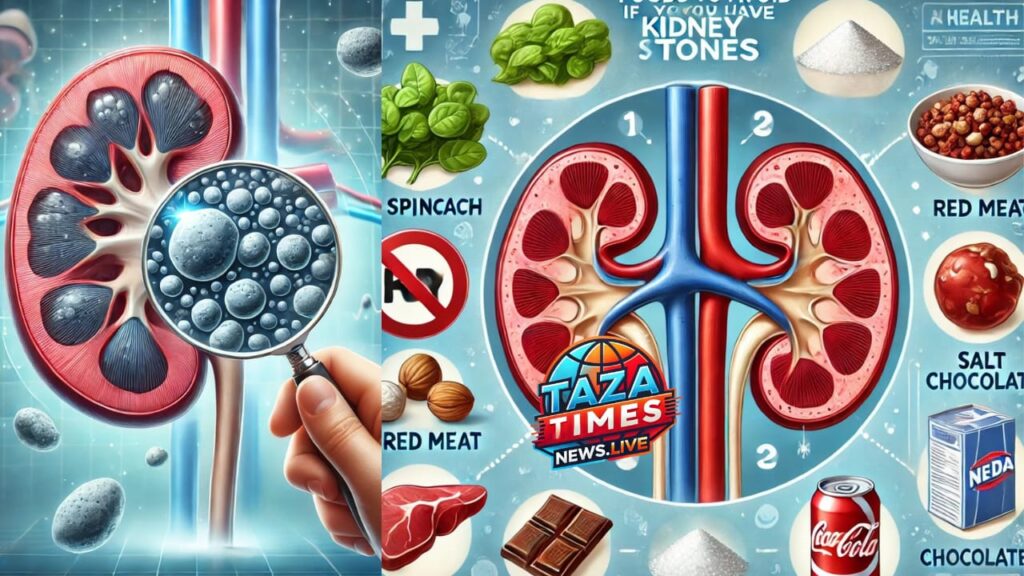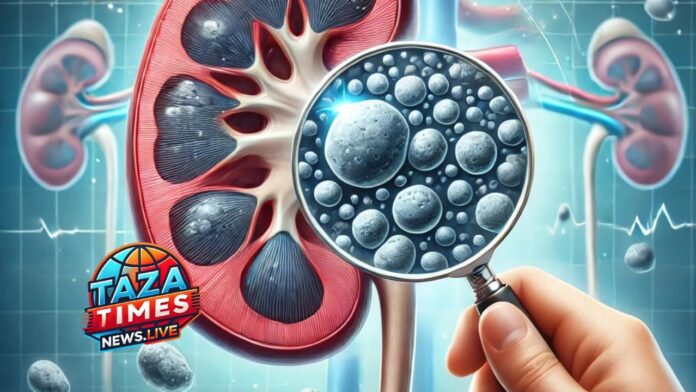Kidney Stones : There are numerous variables that lead to the production of kidney stones. Did you are aware that not consuming enough water can lead to a range of health issues, including kidney stones? When you don’t drink enough water, uric acid isn’t completely drained out of your body, which increases the acidity of your urine and contributes to kidney stone formation. Unhealthy eating habits play an important role. In fact, some foods can directly cause kidney stones to form.
Foods to Avoid with Kidney Stones
Red Meats: People who have kidney stones ought to refrain from red meat because it raises uric acid levels in the urine, which promotes stone formation. Similarly, sweets and caffeine should also be limited as they increase calcium levels in the urine, further contributing to stone development.

Table of Contents
Alcohol: Alcohol should be ignored because it dehydrates the tissues and raises the chance of kidney stone formation.
Salt: People who have kidney stones should consume much less salt. Salty foods might exacerbate the formation of kidney stones.Excess sodium encourages calcium accumulation, so avoid junk food, pizza, burgers, and other high-salt foods.
Citrus Fruits: Although citrus fruits are typically healthful and high in immunity-boosting vitamin C, over consumption can increase oxalate formation, resulting in kidney stones. If you are prone to kidney stones, you should reduce your intake.
Soda: Although soda is pleasant, it can cause existing kidney stones to grow larger. The phosphoric acid in soda contributes to the production of kidney stones.
What Should You Eat for Kidney Stones?
People with kidney stones must stay hydrated at all times. In addition to drinking plenty of water, kids should drink additional fluids, aiming for two to three liters each day.
Adequate calcium consumption is also required. Consume Dairy products and leafy greens in your diet. Low calcium consumption might lead to higher oxalate levels in the urine. Concentrate on fruits, vegetables, whole grains, and low-protein foods.
How commonly do kidney stones occur?
Every year, more than half a million patients visit emergency rooms with kidney stones. It is predicted that one in every ten people may get a kidney stone at some point in their lives.
The prevalence of kidney stones in the United States rose from 3.8% in the late 1970s to 8.8% in the late 2000s. In 2013-2014, the incidence of kidney stones was 10%. Kidney stones affect approximately 11% of men and 9% of women. Other conditions, such as high blood pressure, diabetes, and obesity, might increase the risk of kidney stones.
What exactly constitutes a kidney stone?
A kidney stone is a tough solid generated by chemicals present in urine.There are four types of kidney stones: calcium oxalate, calcium carbonate, uric acid, struvite, and cystine. A kidney stone can be treated by shockwave lithotripsy, uteroscopy, percutaneous nephrolithomy, or nephrolithotripsy. Severe lower back pain, blood in the urine, nausea, vomiting, fever and chills, and urine that smells unpleasant or is hazy are all common symptoms.

kidney stones Symptoms
A few stones in the kidney may be as little as sand grains. Others have the size of a stone. Many questions revolve on the size of a golf ball. In general, the symptoms improve as the size of the stone rises.
One or many of the following indications may be available:
- intense ache on both sides of your lower back.
- more vague pain or stomach ache that won’t go away
- The symptoms involve blood in the urine, nausea/vomiting, fever, and chills.
- Urine that smells foul or seems hazy.
A kidney stone become uncomfortable when it causes infection or a blockage. This swiftly progresses to intense pain. Most kidney stones pass without inflicting any damage, although they rarely do so without generating significant agony. Pain medications may be the sole treatment required for tiny stones. Other treatments may be required, particularly for stones that produce persistent symptoms or other consequences. In severe circumstances, surgery may be necessary.
you join our tazatimesnews Telegram Channel
you join our whatsapp channel
Next News Read –Maha Mrityunjay Mantra : Understand about the significance, meaning, and benefits of chanting the Maha Mrityunjay Mantra



